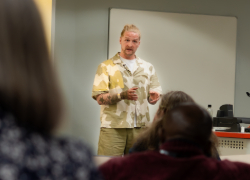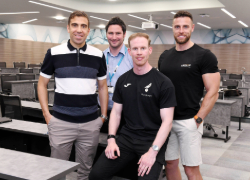Persistent musculoskeletal pain tackled
Persistent musculoskeletal pain conditions such as low back pain are common in the UK. They are responsible for much disability and suffering and cost the UK economy billions of pounds annually.
Dr Cormac Ryan and Professor Denis Martin, with clinical collaborators and international academic colleagues, are undertaking a programme of work to improve our understanding of persistent pain’s underlying pathology and to research the efficacy of new treatments.
In collaboration with European colleagues and James Cook University Hospital (JCUH) Middlesbrough, Cormac and Denis are currently undertaking a clinical trial on the effectiveness of TENS (transcutaneous electrical nerve stimulation) for people with upper limb complex regional pain syndrome.
In this debilitating syndrome, the painful limb becomes dissociated from the brain’s image of it, perhaps by a mechanism akin to the limb neglect experienced by some stroke sufferers. The result is a vicious cycle of reducing function and increasing pain.
Dr Ryan and Professor Martin hypothesise that if TENS is applied to the neglected limb over a number of weeks it may help to normalise the link between the limb and the brain’s image of the limb, reducing the pain. TENS units are cheap, simple to use and well-suited to self-management, so this study, funded by the British Association of Hand Therapists, may point the way to a really practical intervention for this intransigent condition.
Central to the success of novel interventions like this is good patient education. Helping people to understand the neurophysiology underlying their painful condition is important for empowering them to engage in their own care, and might facilitate adherence to treatment and, ultimately, lead to better clinical outcomes.
Dr Ryan said: ‘We recently published a review article identifying pain neurophysiology education as a clinically effective education for patients with persistent pain. However, we were acutely aware that no-one knew if patients who underwent this education really changed their understanding of pain.
'To investigate this we carried out interviews with patients after they received the education and found that, while their theoretical knowledge of pain neurophysiology had increased, they were unable to relate that information back to themselves. This may be limiting the effectiveness of the education.’
In collaboration with James Cook University Hospital (JCUH) Dr Ryan and Professor Martin are now investigating this further in a study funded by the Chartered Society of Physiotherapy. They aim to identify potential ways in which the education might be modified to help patients apply the information to themselves and in doing so perhaps enhance the education’s clinical effectiveness.
 Teesside University raising aspirations for young people in
...
Teesside University raising aspirations for young people in
... Teesside University awards Honorary Doctorates to industry
...
Teesside University awards Honorary Doctorates to industry
... Alumni support elite football event
Alumni support elite football event